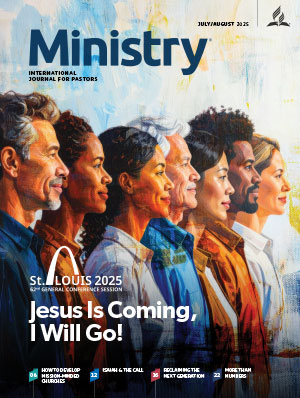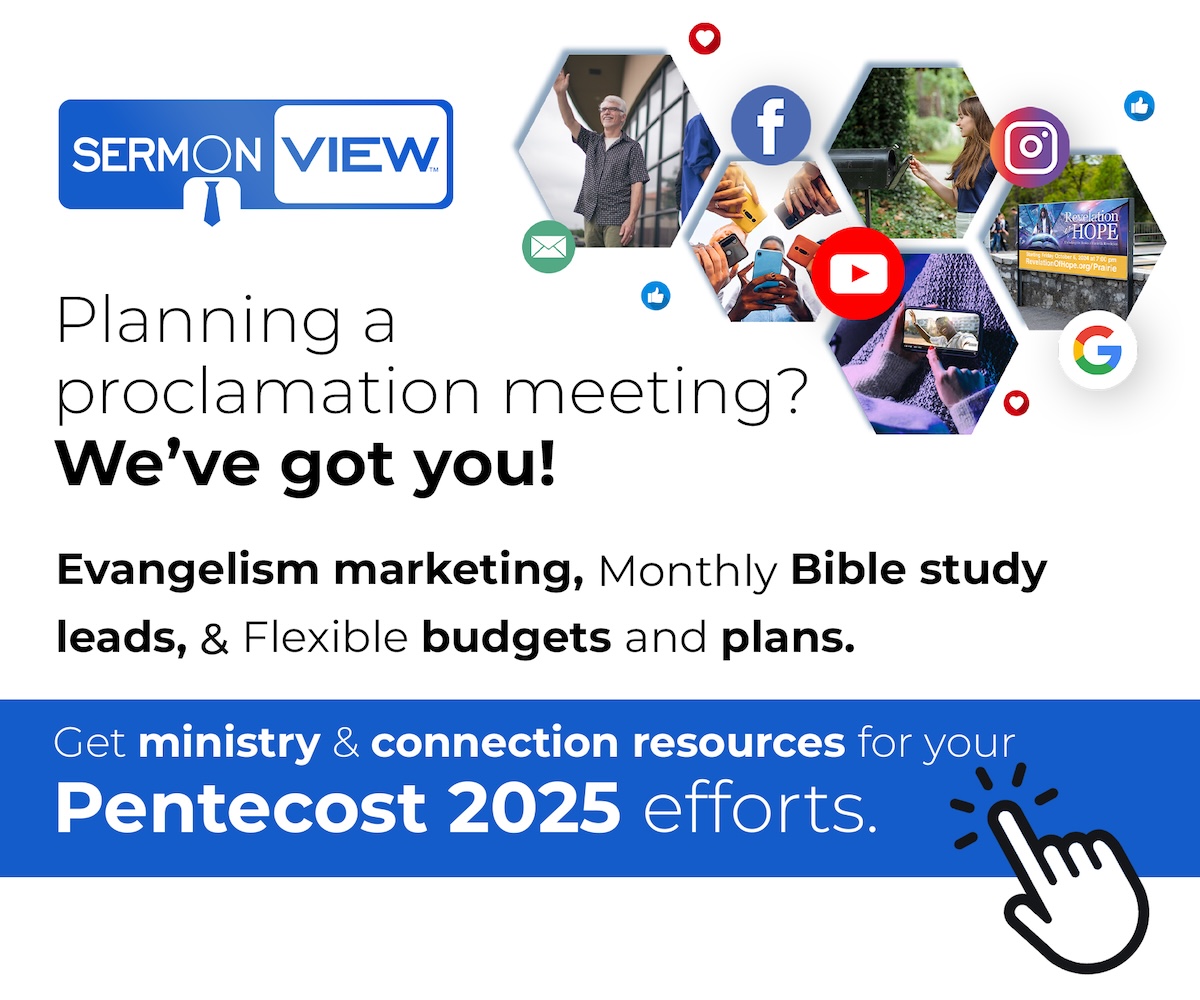Editor’s note: Wintley Phipps, MDiv, is a world-renowned singer, an evangelist, an entrepreneur, and an ordained minister of the Seventh-day Adventist Church. He travels the world sharing God’s love through his preaching and singing.
Jeffrey Brown (JB): Pastor Phipps, you are world-renowned for your decades of music ministry. You have sung before royalty and presidents. And you were part of the Billy Graham Evangelistic team—is that correct?
Wintley Phipps (WP): I gave my life to Jesus at sixteen years old while attending Kingsway College in Oshawa, Ontario, Canada. Under deep conviction I promised the Lord that for the rest of my life I would sing only for His glory.
God said to me, “Son, if you can just be faithful, to the best of your ability, I will take your life down an unusual path. You will sing to the masses, and you will speak truth to people of influence and power.” Little did I know I was hearing God speak into my soul—a calling, a divine mandate that would become the roadmap for my life and ministry.
I remember one day I was singing in Washington, and a gentleman came in with his entourage. I extended my hand and said, “Sir, I would like to introduce myself.”
“I know who you are,” he said. “I am a fan.” It was His Majesty King Abdullah II of Jordan, sharing with me that his life had been touched by my music ministry.
Because of the power of God, I’ve been honored to sing for seven presidents of the United States of America. In 1992, I was blessed to have been invited by Billy Graham to sing “How Great Thou Art” along with a five-thousand-voice Russian choir in the Olympic Stadium in Moscow. And I can never forget the feeling of being in the crowd that welcomed Nelson Mandela when he came out of prison.
I only share this as a testimony to say that our God can do anything and to remind everyone that God keeps His promises to young people who seek His face and dedicate their lives to Him. My ministry experiences have been rich and memorable. But back in 1972, when God said I’d be singing to the masses, you must understand—that was before the internet as we know it today would make it possible for a pastor of a small church to reach millions through technology.
JB: Yes, many may not know that you are a local church pastor.
WP: I have been a church pastor since 1978. In Washington, DC, God allowed me to minister at the Capitol Hill Seventh-day Adventist Church to some of the most powerful people in America—from senators and congresspeople to several who sat in the Oval Office.
The church I pastor now, the Palm Bay Seventh-day Adventist Church in Palm Bay, Florida, is a very loving and supportive church, and it has been my honor to proclaim the three angels’ messages from the Palm Bay pulpit for twenty-three years, more years than all of the other churches I pastored combined.
JB: What have you found to be the most demanding task in ministry?
WP: I think the most demanding task in ministry has been preparing relevant, Christ-centered sermons and devotionals every week to help my members grow to be more like the character of Christ.
In the seminary at Andrews University, they taught us that for every minute you preach a new, well-researched, inspirational sermon, you need an hour of preparation.
Tending to the spiritual and emotional needs of a congregation can be very demanding, and striking the right balance is always a work in progress.
It also can be intimidating when you realize that, because of the technologies used today, every sermon you preach will be archived and shown around the world until Jesus comes again. Long after you are gone, somebody’s life will be touched or transformed by the Spirit-led moments you spent praying and studying God’s Word.
Truly, no time spent in service to God is ever wasted, and every minute you invest in preparing to teach and preach has eternal implications.
JB: In this modern era, what tools have you discovered that are time-saving but still thorough?
WP: First, I thank God for the arrival of word processor technology. That meant I no longer wrote my sermons out by hand and had to rewrite them over when I made mistakes. I was an early adopter of Bible study software programs like Logos, e-Sword, and YouVersion. These have been a blessing, but I really wanted something that was totally aligned with Seventh-day Adventist theology and doctrine.
I learned that Charles Spurgeon, the most prolific preacher in modern history—who preached about four thousand sermons in his lifetime—developed a time-saving method to help him in ministry. When he chose the topic on which he wanted to speak, he would send three or four assistants to his library to research the topic and leave the open books on his desk, so his time would be spent in study and not searching for the content to study.
Because I did not have assistants like Charles Spurgeon, I knew I had to utilize every available technology in my research and preparation. Having flown about four and a half million miles alone in ministry, most weeks of my life I was on an airplane, so I did not have access to my reference library.
There are many resources, like Sermons.com, out there. One day, though, in the late 1990s, out of sheer desperation, I decided to do something different and tore apart the books I used most often for sermons and devotionals. I bought two rudimentary scanners and spent a year and a half scanning hundreds of thousands of pages into text files.
I secured a license for a search engine, imported those text files into my search engine, and built my own personalized Phipps CD-ROM. I was then able to take my reference library on the road and study and research for sermons and devotionals on my laptop—often at forty thousand feet in the air.
When I was preaching on grace, the technology allowed me to have virtual Spurgeon assistants working on my behalf, searching for the content I would then study and pray about.
JB: Now that AI technology has arrived, how is it helpful to pastors?
WP: Pastors must be meticulous when using general AI technology. When you ask AI like ChatGPT to research and build a presentation on a question of faith and Bible teaching, you have to watch carefully to make sure the responses are in line with biblical teaching and our doctrinal beliefs.
My team and I recognized that and decided to develop a sermon research building tool called Gospel Truth AI. It is different from other large language models like ChatGPT, Copilot, and Claude in several key ways. I liken ChatGPT and other large language models to the tree of knowledge of good and evil. That’s because, at super speeds, it has read almost everything—good and evil—and has in its memory bank content that does not align with biblical teaching.
We trained Gospel Truth AI to only give responses that are in line with the Bible. We have also trained it to only search from vetted, trusted Adventist resources like the SDA [Seventh-day Adventist] Bible Commentary and Ellen White’s writings. It then organizes the information gathered from these trusted sources and presents it to you in a coherent fashion.
Gospel Truth AI has become the most powerful inspirational tool I have ever used in the preparation of my sermons and devotionals.
JB: What about pastors who preach series—how can AI tools help?
WP: If you ask most language models like ChatGPT to tell you more on the same topic or theme of your original search, you will soon find they begin to flounder. That is because they skim the surface for content gems; they do not mine and dig deeper.
Through the use of a particular linguistic search algorithm, Gospel Truth AI is able to dig deeper with each search for more nuggets and biblical grounded perspectives. Every time you ask it, “Tell me more,” it finds more angles and views to enrich your series of sermons and devotionals.
Most people who use it say that it performs much better than other large language models by staying true to biblical values and doctrines.
JB: So appropriate AI tools can truly be time-saving?
WP: Considering that it takes thirty to forty hours of preparation for each new sermon, appropriate AI tools can save you up to twenty hours each week and enhance the quality of content. For example, with Gospel Truth AI you can actually create sermons and devotionals in almost any major language on earth—like Spanish, French, Portuguese, Hindi, Russian, and Chinese. You can also have the sermons and devotionals read to you in those languages.
We trained it to write using the dimensions of communication and literary approaches and language methods Jesus used in His sermon on the mount, increasing the impact you can make on the hearts of those listening to your presentations. Each month there is the ability to create a hundred sermons and devotionals. Just creating five or ten on the same topic provides you with tremendous research on the theme you are preaching on.1
JB: What final words do you have for pastors today?
WP: I was so inspired when I learned that when John the revelator was banished to the Isle of Patmos, it was after he had grown old in the service of his Lord that he received more communications from heaven than he had received during all the former years of his life. And they were communications for the church for all future time.
That means to me that John the revelator, from the Isle of Patmos, was able to reach and impact more people for the Lord than in all of his previous years of ministry combined. The technology that aided John to reach us—who would live in his future—was the technology of the printed page. Thank God for the technology of the printed page. If John only reached the residents who lived on Patmos, we would not have today the three angels’ messages.
I believe technology is only a tool, and we must ask the Holy Spirit to guide and empower us as we proclaim the Word of God in these last days. And we must bear in mind that as we near the second coming of Jesus—like John the revelator—what we create in minutes can now reach millions of people in seconds. With access to these technologies, every pastor, from any corner of the globe, has the potential to reach more people for the kingdom of God than all the previous years of their ministry combined.
Pastors, I appeal to you, that just as we adopted radio, television, and internet technologies for the kingdom of God, will you ask God to show you how to use these emerging technologies—that are now at our disposal—responsibly and prayerfully?
May God use all of us to fulfill the promise of Jesus found in Matthew 24:14: “And this gospel of the kingdom shall be preached in all the world for a witness unto all nations; and then shall the end come.” Maranatha; even so, come Lord Jesus.
- Learn more about Gospel Truth AI at https://www.gospeltruth.ai/.













